In a previous post, I described a ubiquitin-rhodamine110 (UbRho110) assay, and showed that a ZnF-UBD ligand antagonizes USP5 catalytic activity. UbRho110 is not a native substrate, and validation with native polyubiquitin species in an orthogonal assay is required. To address this, I developed and optimized an internally quenched fluorophore pair (IQF) assay. You can see details on Zenodo.
The IQF assay uses di-ubiquitin substrates, one of which carries a fluorophore that is silenced by a nearby quencher. After the di-ubiquitin substrate is cleaved by a deubiquitinase (DUB) such as USP5, the free fluorophore can be detected through a fluorescence signal (Figure 1).
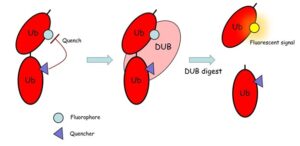 Figure 1. Summary of IQF assay. Image taken from LifeSensors.
Figure 1. Summary of IQF assay. Image taken from LifeSensors.
I tested two di-ubiquitin IQF substrates: Ub2K63 and Ub2K48. A ZnF-UBD ligand, UBTR020994a (KD= 8 ± 2 µM [n=3]) equipotently antagonizes USP5 DUB activity for both diubiquitin substrates in a dose-dependent manner (Figure 2).
a)
b)
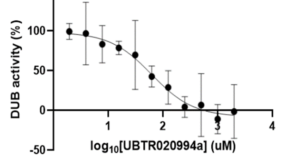
c)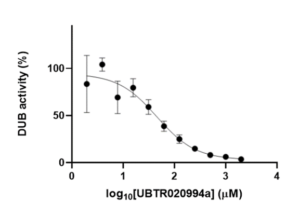
Figure 2. a) Chemical structure of UBTR020994a (KD= 8 ± 2 µM [n=3]) b) Dose-response of UBTR020994a and Ub2K63 (n=3) IC50 ̴ 63 µM c) Dose-response of UBTR020994a and Ub2K48 (n=3) IC50=45 ± 17 µM
In addition to the wild-type (WT) USP5, I tested a R221A and C335S mutant. The R221A is a ZnF-UBD mutant, where R221 co-ordinates ubiquitin binding at the ZnF-UBD. C335S is a mutant of the catalytic cysteine and prevents the cleavage of the isopeptide bond in ubiquitin chains. The R221A mutant has little to no activity with Ub2K48 substrate-comparable to inhibition of the WT-USP5 with a ZnF-UBD antagonist, UBTR020994a. IQF Ub2K63 has approximately 50% activity for R221A mutant, suggesting R221 may be more important for recruitment and placement of Ub2K48 substrate than Ub2K63 substrate. C335S is inactive in the assay.
![]()
![]()
a) b)
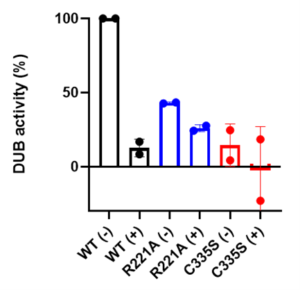
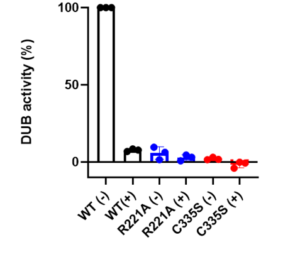
Figure 3. USP5 DUB Activity for wild-type (WT) USP5, a ZnF-UBD mutant (R221A), a catalytic mutant (C335S) ± 2 mM UBTR020994a: a) Ub2K63 (N=2) b) Ub2K48 (N=3)
In the future, I will be repeating experiments with the USP5 mutants and dose-response curves for UBTR020994a for both IQF substrates to confirm the results. I also hope to test other lysine-linked di-ubiquitin substrates, such as K11, using this IQF assay.
